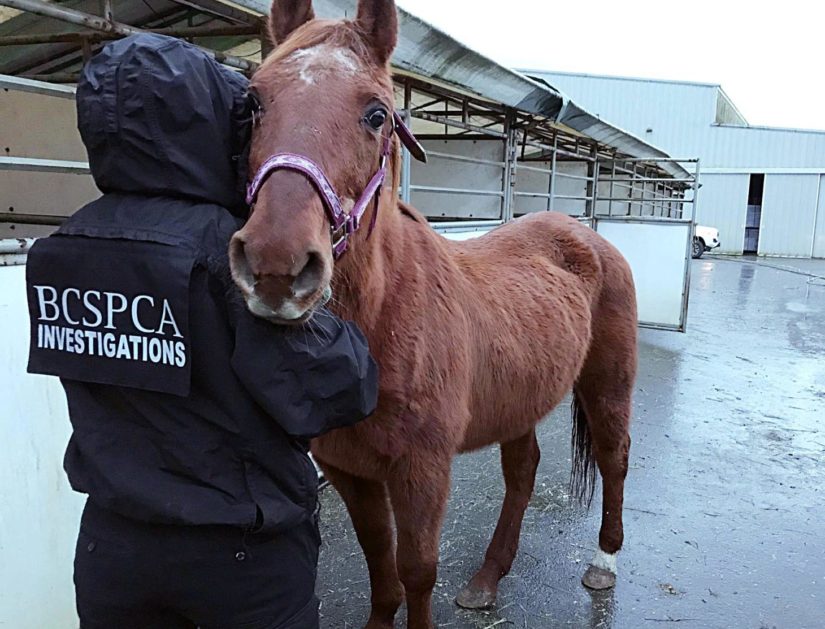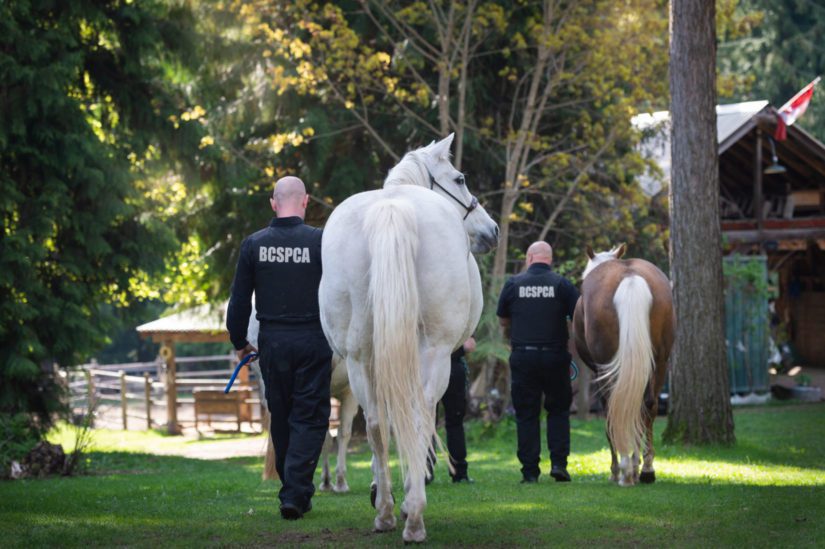Each year the BC SPCA rescues sick, abused, and neglected horses from across the province who need urgent care. Sadly, the horses seized through SPCA cruelty investigations are usually in poor condition, and in many cases require extensive nutritional and medical rehabilitation due to starvation and other health issues.

In 2015 the BC SPCA opened the Good Shepherd Barn in Surrey and the Kelowna Recovery and Adoption Barn to accommodate horses and farm animals involved in cruelty investigations.
Upon arrival to the barns, Leiki Salumets, manager of equine and farm animal care, says it’s crucial that the environment the horses are entering is as stress-free as possible.
“They’ve already been through a stressful day with transfer and being removed from the property. So we need to ensure they are coming into a calm environment,” she says. Staff also take into consideration how the horses are being housed in the barn. Whether that’s being housed with a horse they have already bonded with or housed next door to them — anything to help reduce anxiety and create a more calming experience for the horses.”
“Horses can be quite stressed and often haven’t received much handling in the past and might be fearful of people so it’s all about working with veterinarians and animal behaviorists to help find the least demanding methods as possible to give them that medical care they need,” says Salumets.
All horses who come into care undergo veterinarian assessments to address their medical concerns as soon as possible and receive follow-up examinations if needed. The most common issues found among horses brought into care include being underweight, dental issues, overgrown hooves, skin ailments, wounds, and internal and external parasites.
Because the horses have often dealt with trauma, Salumets says staff also need to consider the horse’s psychological needs. Building trust through positive reinforcement whenever the horses are being handled is essential. Whether that’s in preparation for medical treatments and veterinary care, or simply during every day husbandry tasks such as feeding, cleaning stalls or grooming.
“Many of these horses might not have had positive handling experiences in the past and might be dealing with anxiety and fear so we really try to work on those behaviours and give them a positive new start,” she says. “By utilizing positive reinforcement handling methods, we can really build trust with these horses so that we are better able to provide care, reduce stress and carry forward that trust with their adopters down the road.”

After they’ve had initial assessments and veterinarian exams, Salumets says staff consider whether a horse would need to be moved into foster care or go into specialized housing. For example, a pregnant mare, or a mare and her foal, might go into specialized care. Stallions coming into care require separate, specialized housing. Senior horses with dental issues require special diets, as do any underweight horses.
“We work with people who have experience with those animals. We do try to match them up with the best foster homes for specialized needs. Rehabilitation requires diligent monitoring and is labour intensive. We rely heavily on our fosters who volunteer their time to care for and work with these horses to help them recover so we can find them permanent adoptive homes.”
All of the foster homes are vetted through an application process. A home inspection follows as well as any necessary training. “We keep very detailed documentation of the horses in our care so we can set them up for success for the foster and, eventually, for adoption,” says Salumets.
It can take months, sometimes even years, for a horse to reach an ideal body and health condition, according to Salumets, which is why the support of donors is key.
“These horses do not recover overnight. A lot of work goes into their care,” she says. “It takes a lot of resources, and a lot of people as well. Along with veterinarians, farriers, haulers and nutritionists, we really rely on our staff, volunteers and fosters to give these horses the best care so that they can have the best possible chance for a new life of the care and comfort they so desperately need and deserve.”
More like this
Caring for horses in your community
Are you passionate about farm animal issues? Subscribe to FarmSense newsletter.
